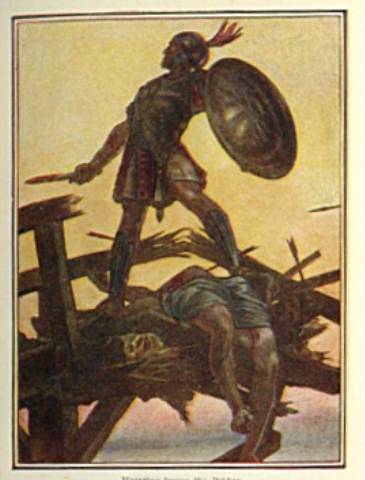II. Of Horatius
II. OF HORATIUS: HOW HE KEPT THE BRIDGE
This story you will like, for it is about three brave men and the noble deed they did -- how they saved Rome from falling into the hands of her enemies the Etruscans. Horatius Codes, Spurius Lartius and Herminius lived in the days when Rome was young, when the Romans were quite a small people. After many years they grew, as you know, to be the greatest nation in the world, the most powerful and the most war-like. Still even in those early times they were a fighting people.
Italy was then divided up into little kingdoms and cities, between one or other of which there was nearly always war. The Etruscans were the most powerful, and very eager they were to conquer the Romans: indeed, before they were finally driven out of Italy they had won for themselves a great part of the Roman possessions and forced the Roman people to sue for peace: but this was later, and in the end they had to go.
At the time when Horatius and his friends lived there was civil war in Rome. The people, led by the nobles, or the patricians as they were called, had risen in revolt against their tyrant king, Tarquinius Superbus or Tarquin the Proud. So much had the patricians suffered under the tyrant's rule and so fiercely did they hate him, that after the revolution they made the people swear never to allow another king to reign in Rome.
Tarquin fled fearing for his life -- fled to Etruria to ask for help, and no man knew when he might come again to try and win back the kingdom. All were sure, however, that he would not leave the city long in peace and that the Etruscans would only be too glad of an excuse to make war on them.
Thus Rome was made republic. Junius Brutus, the leader of the revolution, and another patrician ruled as consuls, that is to say, chief magistrates. They had the power of a King, but being two, the power was divided, and so each was less likely to act unjustly, or to wrong the people. I tell you this because these two were the first Roman Consuls of the great Roman Republic. Later on it was found better in times of war to give all power into the hands of one man, called the Dictator, as the consuls often quarreled among themselves and so endangered the safety of the State.
Yet at first all went well: the patricians were content, the people did not complain: the laws which Tarquin had changed were righted again: a plot which some friends of the king had started, in the hope of throning him again, was discovered and the Conspirators put to death.
Then lo! one day the cry arose in the city, 'To arms! to arms! The Etruscans are here!' Out rushed the soldiers, battleaxe in hand: straight to the banks of the Tiber they ran, to that place where stood the Sublician Bridge, for over this narrow wooden bridge, the enemy would have to pass before they could reach the city.
All the citizens followed; men, women, children, and slaves, ran helter-skelter to the bank of the river to watch their soldiers break down the bridge. Only thus could Rome be saved and the Etruscans prevented from entering the city.
But it was too late! too late! Proud Tarquin with Lars Porsenna of Clusium at the head of a strong Etruscan army stood there on the other side ready to cross the river. 'They will be over before we can cut down the bridge!' shouted the soldiers.
'We are lost! Rome will be taken! The gods have forsaken us!' cried the women wildly, and clasped their children close and wept.
On a sudden, clear and strong, above the noise and the tumult rang the voice of Horatius. 'The city shall be saved! The bridge shall fall! By the gods, I swear it!' he cried, 'Romans! Who will keep yonder side with me so that none shall pass while the work is done?'
'I will!' answered Spurius Lartius.
'And I!' said Herminius, and lightly and proudly the three crossed the bridge even unto the end where the Etruscans were.
'Lars Porsenna, ye pass not by here save only ye pass over our dead bodies!' they cried. And when the enemy stood still in astonishment, 'Etruscans, ye do well to fear three Romans!' laughed Horatius,
'Forward!' thundered Porsenna, and on pressed the Etruscans by threes and fours, (for the passage was narrow), only to be slain or thrust back by the valiant three, while behind them the Roman soldiers worked for dear life, slashing and hacking at the bridge whose downfall would save Rome.
The women watching on the banks could see it fall, beam by beam -- could see every moment the gap widening between the three brave men and the bridge. Wider and wider it grew, and with one voice the Romans cried, 'Jump! Horatius, Lartius, Herminius! Jump while you can!'
Lartius and Herminius obeyed. Again rose the cry -- 'Horatius, come while there is time!' 'Not till the last beam is down!' answered Horatius, and another Etruscan fell to the ground before him.
Horatius keeps the Bridge
Swift and furious flew the axes: beam after beam crashed into the water. At last! At last! The bridge was down, and Horatius, leaping into the river, swam to the other side unhurt. Rome was saved.
You can picture for yourselves the greeting that was given to him, how the people rejoiced, what honours were paid to him and his two friends, but for such brave men the greatest reward and honour was in knowing that they had saved the city they loved so dearly.
